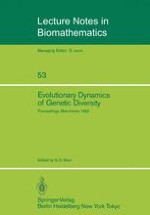1984 | OriginalPaper | Buchkapitel
Genetic Polymorphism and Neomutationism
verfasst von : Masatoshi Nei
Erschienen in: Evolutionary Dynamics of Genetic Diversity
Verlag: Springer Berlin Heidelberg
Enthalten in: Professional Book Archive
Aktivieren Sie unsere intelligente Suche, um passende Fachinhalte oder Patente zu finden.
Wählen Sie Textabschnitte aus um mit Künstlicher Intelligenz passenden Patente zu finden. powered by
Markieren Sie Textabschnitte, um KI-gestützt weitere passende Inhalte zu finden. powered by
In the last several decades neo-Darwinism, particularly the balance theory of evolution (Dobzhansky 1955), has remained a dominant force in evolutionary biology. In this theory natural selection plays the most important role in determining the extent of genetic polymorphism and the rate of evolution. Although mutation is regarded as the ultimate source of genetic variation, its role in evolution is considered to be minor. This is because mutation occurs repeatedly at the phenotypic level and most natural populations seem to carry a sufficient amount of genetic variability, so that almost any genetic change can occur by natural selection whenever the change is needed. Namely, natural selection plays a creative role (Mayr 1963; Dobzhansky 1970). This is in sharp contrast to the mutationist’s view of evolution that prevailed in the first quarter of this century (e.g., Morgan 1925, 1932). In mutationism (in Morgan’s sense not de Vries’) natural selection plays a less important role than mutation, and its chief role is to preserve rare useful mutations and eliminate unfit genotypes; all creative roles are given to mutation. In the 1930’s and 1940’s mutationism gradually became unpopular among biologists for various reasons, and by 1950 it almost disappeared.
